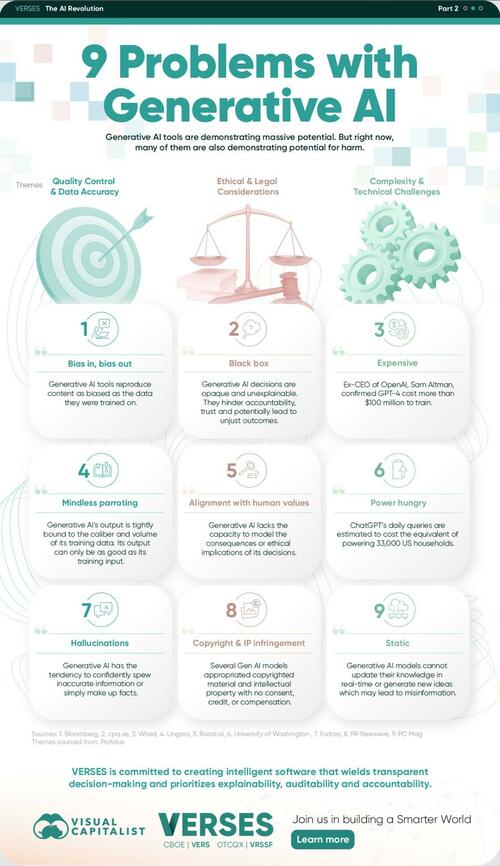
In the rapidly evolving landscape of artificial intelligence, generative AI tools are demonstrating incredible potential. However, their potential for harm is also becoming more and more apparent.
Together with their partner VERSES, Visual Capitalist's Katie Jones and Sabrina Fortin have visualized some concerns regarding generative AI tools using data from a variety of different sources. Many of them fall into one of the following categories: quality control & data accuracy, ethical considerations, or technical challenges—with, of course, a certain degree of overlap.
PROBLEM 1:
Bias In, Bias Out
Theme: Quality Control & Accuracy
One of the critical issues with generative AI lies in its tendency to reproduce biases present in the data it has been trained on. Rather than mitigating biases, these tools often magnify or perpetuate them, raising questions about the accuracy of their applications—which could lead to much bigger problems around ethics.
PROBLEM 2:
The Black Box Problem
Theme: Ethical & Legal Considerations
Another significant hurdle in embracing generative AI is the lack of transparency in its decision-making processes. With thought processes that are often uninterpretable, these AI systems face challenges in explaining their decisions, especially when errors occur on critical matters.
It’s worth noting that this is a broader problem with AI systems and not just generative tools.
PROBLEM 3:
High Cost to Train and Maintain
Theme: Complexity & Technical Challenges
Training generative AI models like large language model (LLM) ChatGPT is extremely expensive, with costs often reaching millions of dollars due to the computational power and infrastructure required. For instance, now Ex-CEO of OpenAI, Sam Altman confirmed that ChatGPT-4 cost a whopping $100 million to train.
PROBLEM 4:
Mindless Parroting
Theme: Quality Control & Accuracy
Despite their advanced capabilities, generative AIs are constrained by the data and patterns they were trained on. This limitation results in outputs that may not encompass the breadth of human knowledge or address diverse scenarios.
PROBLEM 5:
Alignment with Human Values
Theme: Ethical & Legal Considerations
Unlike humans, generative AIs lack the capacity to consider the consequences of their actions in alignment with human values.
While instances like the AI-generated “Balenciaga Pope” may appear to be harmless, it’s important to recognize that deepfakes could be employed for more harmful purposes, such as spreading false information in the face of a public health crises.
This highlights the need for more frameworks that ensure these systems operate within ethical boundaries.
PROBLEM 6:
Power Hungry
Theme: Complexity & Technical Challenges
The environmental impact of generative AI cannot be overlooked. With processing units consuming substantial power, models like ChatGPT cost as much as powering 33,000 U.S. households, with just one inquiry being 10 to 100 times more power hungry than one email.
PROBLEM 7:
Hallucinations
Theme: Quality Control & Accuracy
Generative AI models have been known to create fabricated statements or images when faced with data gaps, raising concerns about the reliability of their output and potential consequences.
For example, in a Google Bard promotional video, the chatbot incorrectly asserted that the James Webb Space Telescope captured the first images of a planet beyond Earth’s solar system.
PROBLEM 8:
Copyright & IP infringement
Theme: Ethical & Legal Considerations
The ethical use of data becomes paramount when considering that several generative AI tools appropriate copyrighted work without consent, credit, or compensation, infringing upon the rights of artists and creators.
OpenAI recently introduced a compensation program called Copyright Shield that covers legal costs for copyright infringement suits for certain customer tiers, rather than removing copyrighted material from ChatGPT’s training dataset.
PROBLEM 9:
Static Information
Theme: Complexity & Technical Challenges
Keeping generative AI models up to date requires substantial computational resources and time, presenting a formidable technical challenge. Some models, however, are designed for incremental updates, offering a potential solution to this complex issue.
Meet VERSES
In the pursuit of harnessing the power of AI, a careful balance must be struck to ensure ethical, transparent, and impactful advancements in this transformative field.
VERSES is committed to creating intelligent software that wields transparent decision-making.
Learn more about how VERSES is building a smarter world.
In the rapidly evolving landscape of artificial intelligence, generative AI tools are demonstrating incredible potential. However, their potential for harm is also becoming more and more apparent.
Together with their partner VERSES, Visual Capitalist’s Katie Jones and Sabrina Fortin have visualized some concerns regarding generative AI tools using data from a variety of different sources. Many of them fall into one of the following categories: quality control & data accuracy, ethical considerations, or technical challenges—with, of course, a certain degree of overlap.
Let’s dive into it.
PROBLEM 1:
Bias In, Bias Out
Theme: Quality Control & Accuracy
One of the critical issues with generative AI lies in its tendency to reproduce biases present in the data it has been trained on. Rather than mitigating biases, these tools often magnify or perpetuate them, raising questions about the accuracy of their applications—which could lead to much bigger problems around ethics.
PROBLEM 2:
The Black Box Problem
Theme: Ethical & Legal Considerations
Another significant hurdle in embracing generative AI is the lack of transparency in its decision-making processes. With thought processes that are often uninterpretable, these AI systems face challenges in explaining their decisions, especially when errors occur on critical matters.
It’s worth noting that this is a broader problem with AI systems and not just generative tools.
PROBLEM 3:
High Cost to Train and Maintain
Theme: Complexity & Technical Challenges
Training generative AI models like large language model (LLM) ChatGPT is extremely expensive, with costs often reaching millions of dollars due to the computational power and infrastructure required. For instance, now Ex-CEO of OpenAI, Sam Altman confirmed that ChatGPT-4 cost a whopping $100 million to train.
PROBLEM 4:
Mindless Parroting
Theme: Quality Control & Accuracy
Despite their advanced capabilities, generative AIs are constrained by the data and patterns they were trained on. This limitation results in outputs that may not encompass the breadth of human knowledge or address diverse scenarios.
PROBLEM 5:
Alignment with Human Values
Theme: Ethical & Legal Considerations
Unlike humans, generative AIs lack the capacity to consider the consequences of their actions in alignment with human values.
While instances like the AI-generated “Balenciaga Pope” may appear to be harmless, it’s important to recognize that deepfakes could be employed for more harmful purposes, such as spreading false information in the face of a public health crises.
This highlights the need for more frameworks that ensure these systems operate within ethical boundaries.
PROBLEM 6:
Power Hungry
Theme: Complexity & Technical Challenges
The environmental impact of generative AI cannot be overlooked. With processing units consuming substantial power, models like ChatGPT cost as much as powering 33,000 U.S. households, with just one inquiry being 10 to 100 times more power hungry than one email.
PROBLEM 7:
Hallucinations
Theme: Quality Control & Accuracy
Generative AI models have been known to create fabricated statements or images when faced with data gaps, raising concerns about the reliability of their output and potential consequences.
For example, in a Google Bard promotional video, the chatbot incorrectly asserted that the James Webb Space Telescope captured the first images of a planet beyond Earth’s solar system.
PROBLEM 8:
Copyright & IP infringement
Theme: Ethical & Legal Considerations
The ethical use of data becomes paramount when considering that several generative AI tools appropriate copyrighted work without consent, credit, or compensation, infringing upon the rights of artists and creators.
OpenAI recently introduced a compensation program called Copyright Shield that covers legal costs for copyright infringement suits for certain customer tiers, rather than removing copyrighted material from ChatGPT’s training dataset.
PROBLEM 9:
Static Information
Theme: Complexity & Technical Challenges
Keeping generative AI models up to date requires substantial computational resources and time, presenting a formidable technical challenge. Some models, however, are designed for incremental updates, offering a potential solution to this complex issue.
Meet VERSES
In the pursuit of harnessing the power of AI, a careful balance must be struck to ensure ethical, transparent, and impactful advancements in this transformative field.
VERSES is committed to creating intelligent software that wields transparent decision-making.
Learn more about how VERSES is building a smarter world.
Loading…





